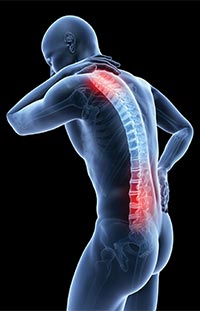What is chronic back pain?
Chronic back pain is a common condition that can affect people of all ages. Back pain can occur anywhere between the neck and the lower spine. It is considered chronic when your pain lasts for 12 weeks or longer.
What are the symptoms of chronic back pain?
You may experience the following symptoms if you have chronic back pain:
- Soreness or dull ache
- Burning, sharp, or stabbing pain that doesn’t go away
- Tingling sensation in one or both legs
- Trouble sleeping
What causes chronic back pain?
Chronic back pain can occur due to several reasons. Common causes include:
Muscle or ligament strain
Repeated heavy lifting or sudden and awkward movements can strain lower back muscles and spinal ligaments easily. Back injuries that occurred from strenuous sports or traumatic accidents may also trigger painful muscle spasms.
Arthritis
It is an inflammatory disease that thins the cartilage in the spine. Arthritis may also lead to spinal stenosis, a condition that narrows the space around the spinal cord.
Osteoporosis
Porous and brittle bones may cause painful fractures in the spine's vertebrae.
Disc degeneration
Ruptured or bulging discs between the vertebrae in the spine can put pressure on the spinal cord and nerves.
How do I know if my back pain is serious?
If you experience any of the following symptoms below, please consult an orthopaedic specialist immediately to prevent your condition from worsening:
- Sudden numbness or weakness in the legs
- Loss of bladder or bowel control
- Severe abdominal pain
- Persistent fever
How is chronic back pain diagnosed?
 Your orthopaedic specialist will perform a physical examination to assess your ability to sit, stand, walk, and lift your legs. Besides noting your medical history and symptoms, the orthopaedic specialist may also request for imaging tests, such as an X-ray or MRI scan, to detect any spinal cord, muscle, or nerve damage.
Your orthopaedic specialist will perform a physical examination to assess your ability to sit, stand, walk, and lift your legs. Besides noting your medical history and symptoms, the orthopaedic specialist may also request for imaging tests, such as an X-ray or MRI scan, to detect any spinal cord, muscle, or nerve damage.
What treatments are there for chronic back pain?
The orthopaedic specialist will work with you to decide on the appropriate treatment plan. It may include one or more of the following:
Medications
Pain relievers and non-steroidal anti-inflammatory drugs may be prescribed to relieve back pain and inflammations.
Physiotherapy
The orthopaedic specialist may refer you to a physiotherapist, where you will be taught useful stretching and core strengthening exercises to correct your posture, and strengthen the muscles supporting your back.
Injections
Epidural steroid injections may be administered into the trigger points to relieve pressure.
Surgery
Surgery can be an option for people whose condition did not improve or have worsened despite other treatments. Such procedures are typically reserved for those who experience pain due to the narrowing of the spine (spinal stenosis), or a herniated disk that hasn't responded to other treatments.
How should I sleep with back pain?
 Finding the right sleeping position can help ease your pain. Placing a pillow between your legs when you are sleeping on the side may help restore the alignment of your pelvis, hips and spine.
Finding the right sleeping position can help ease your pain. Placing a pillow between your legs when you are sleeping on the side may help restore the alignment of your pelvis, hips and spine.
If you are sleeping on your back, place a pillow under your knees to provide additional support for your spine. Sleeping on your stomach puts a lot of strain on your back, therefore putting a pillow under your pelvis and lower abdomen can relieve some of that pressure.
Doing light stretches before going to bed can also help to reduce lower back pain.
Make an appointment
Make an appointment to consult an orthopaedic specialist. Select "Specialist Appointment". Under Specialist Appointment Details, select "Orthopaedic Surgery" or "Pain Management".
Make an enquiry. We will get back to you within 2 working days. You can reach us at 6311 2310.

